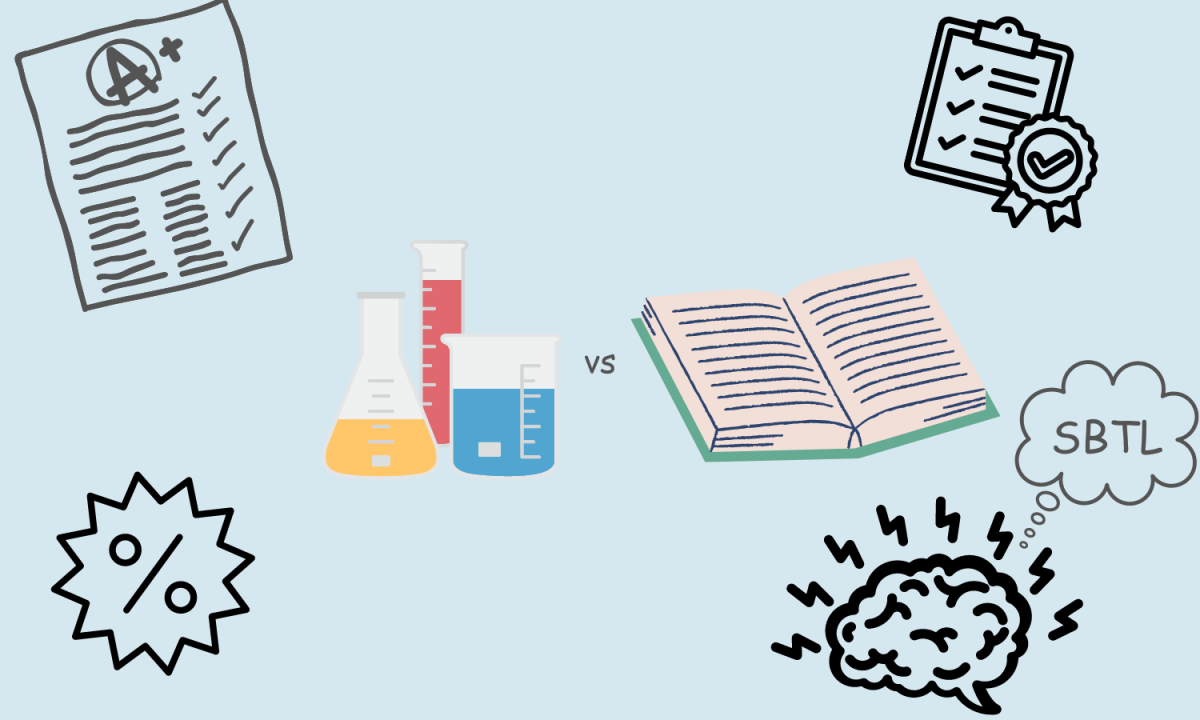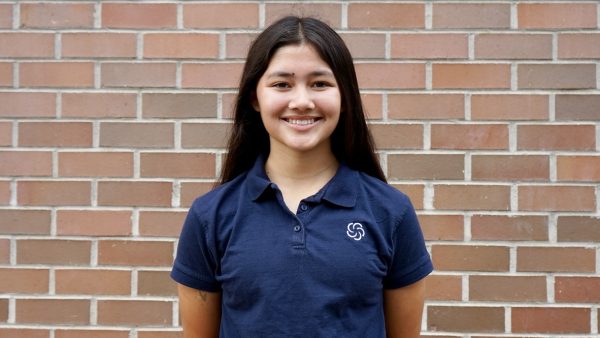While some feel Castilleja’s transition to Standards-Based Teaching and Learning is a positive change, 11 out of 13 interviewed community members think the rollout of the system was poorly executed, though well intentioned. Generally, students found it to be more anxiety-inducing than stress-relieving when introduced in the 2023 Fall semester.
Students felt the efficacy of SBTL varied depending on the class. Anna Kocher ‘26 thinks “it makes sense in some classes, whereas it’s really hard to ‘standardize’ content in others.”
Chemistry Honors was a fan favorite in terms of SBTL in execution. Students attributed their positive experience to Colin Quinton’s knowledge and past use of SBTL: “He’s had this system down for years, so he knows what he’s doing,” said Chemistry Honors student Landry Agnich ‘26.
Chemistry Honors has been a standards-based class for the past four years. Quinton implemented SBTL in his class as he saw that “traditional grading absolutely favored a certain kind of student” and he wanted to find a system that would allow “different kinds of students to be successful in the same space.”
Quinton noted that he has been looking for an alternative to a point-based system across his 30 years of teaching. He acknowledged the time it’s taken to somewhat “perfect” the standards in his class and said he’s constantly developing it to best support students.
“It takes time for even experienced, dedicated, thoughtful teachers to really work through how it has to work because it’s [SBTL] a practice that’s so different from a traditional grading system,” he said.
While SBTL relies heavily on teachers adjusting to and working to modify standards so they work for their class, Quinton detailed the secret to a functioning system: Trust. In order to relieve some of the anxiety around a standards-based class, “not only does the student need to trust the teacher, but the teacher has to trust that the student innately, inherently wants to learn,” he said.
According to Quinton, this mutual trust will ensure students and teachers are working together in a partnership that fosters risk-taking in learning without the threat of failure.
Similarly, Hana Osman ‘27 said that “physics [classes] have definitely got standards down. They know what they’re doing.” Osman said she wishes the grading systems in other classes could be as simple as Physics and said she wants “someone to create a program for all teachers so they don’t have their own separate grading systems.”
While standards might’ve been a success in Chemistry Honors and 9th grade Physics, “There are classes that it’s just never going to work in,” Riley Sterling ‘24 said.
After the Fall 2023 semester, the history department announced they would be suspending use of SBTL in all 9th-11th grade history classes. When asked about the sudden transition, Carly Fox said she believes SBTL is “a wonderful way to center actual student growth and students’ experiences in the classroom.”
Fox noted that Castilleja teachers are dedicated to, “finding and practicing the best form of pedagogy that supports our students’ well-being, growth, and learning.” While she said she believes standards could be a vital tool and resource in this mission, she said the History Department needs “a little more time to make sure we’re doing this in the most thoughtful, empowering way for students.”
Fox said she looks forward to helping develop history standards and is in support of the school’s commitment to finding and maintaining the most equitable grading practices possible.
While some community members noted they felt less stressed in SBTL-based courses at certain times of the semester when assignments and tests couldn’t affect their grade, anxiety levels were magnified toward the end of the semester when assignments “mattered.” For example, the Connecting History to Community freshman history sections had a total of two assignments throughout the whole semester that made up their entire grade. Similarly, the Sophomore sections of the same course had three total graded assignments for the semester.
Ella Kemp ‘25 commented on the heightened stress surrounding first-semester finals as receiving a single 3 on a project or test could drop your overall grade in the class by several letters. Translating standards into letter grades seems to be one of the biggest downfalls in SBTL practices at Castilleja. Shea Watson ‘27 agreed, noting how SBTL “doesn’t really matter because [teachers] round up to a letter grade at the end of the day anyways.”
Other than finals, Kemp noted that though she was initially “stressed when Casti started implementing standards-based grading because [she] was unfamiliar with it,” she’s “learned to navigate the grading system” and has had “a pretty smooth experience” with SBTL.
In addition to an increase in stress levels, the general confusion among students working to decipher different systems of standards used in each of their individual classes seems to have taken away from learning time.
Watson said the standards in her classes have changed a lot throughout the course of the fall semester, noting,“We talk a lot about it every time [the system] changes.” And one time, “We spent half a class talking about standards because everyone has so many questions about it.”
Sterling said she felt as though SBTL “makes getting an A more about playing the system than it does about understanding the content.” And Sterling is not alone in this feeling: Many students said they were “constantly chasing an A,” as Agnich put it, last semester more than they had in years past. Yick noted how the system “puts more emphasis on getting an A,” directly opposing one of the main sentiments of SBTL.
To improve the SBTL experience, students suggested limiting the use of the practice to only certain classes. Some said they think it works really well in STEM-focused classes and not in Humanities classes, whereas others said the opposite. Regardless, what students can agree on is that standards need to be uniformly deployed across classes.
Every student explained vastly different yet equally confusing systems of standards in their classes. Many have expressed frustrations with the inconsistencies in grading in the same classes with different teachers. This poses the question: Why can’t standards be standard across classes, or at the very least, across subjects?
Lastly, students believe teachers should have had more time to figure out standards and to create curriculums that coincide with SBTL. Whether or not teachers had enough time to make initial adjustments to their courses, it seems an essential piece of finding the right SBTL “fit” takes time and modifications.




